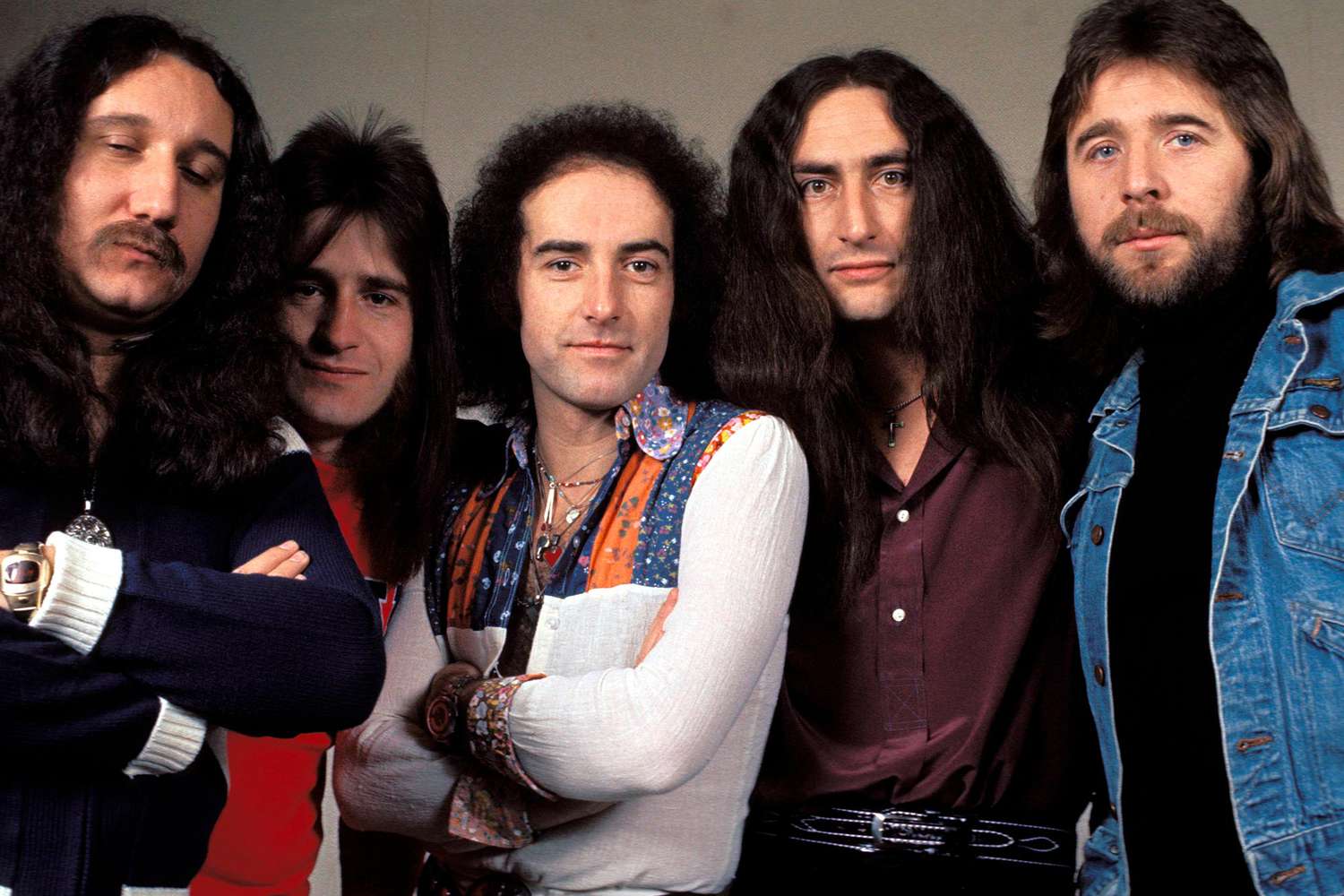Uriah Heep is a British rock band formed in London in 1969, known for their blend of progressive rock, hard rock, and heavy metal. With their intricate harmonies, prominent organ sounds, and mystical themes, Uriah Heep helped define the sound of British rock in the 1970s. Alongside bands like Deep Purple and Black Sabbath, Uriah Heep were pioneers in the heavy rock genre, earning a devoted fanbase worldwide. Their albums “Demons and Wizards,” “Look at Yourself,” and “The Magician’s Birthday” are regarded as classics, showcasing their talent for combining powerful riffs with melodic structures and fantasy-themed lyrics. Though they never achieved the mainstream success of some of their peers, Uriah Heep’s influence on rock and metal remains significant, especially within the realms of progressive and symphonic metal.
Early Formation and Rise to Fame
The band was formed by guitarist Mick Box and vocalist David Byron following the breakup of their previous band, Spice. They were soon joined by keyboardist Ken Hensley, bassist Paul Newton, and drummer Alex Napier. The band’s name was inspired by the character Uriah Heep from Charles Dickens’ David Copperfield, reflecting their early penchant for literary and fantasy influences.
Their debut album, “…Very ‘Eavy …Very ‘Umble” (1970), introduced their heavy, organ-laden sound and harmonized vocals. Though initial critical reception was mixed, the album included “Gypsy,” a track that quickly became a fan favorite and showcased their signature style: heavy guitar riffs paired with Hensley’s commanding organ work.
Breakthrough with “Look at Yourself” and “Demons and Wizards”
The band’s commercial breakthrough came with their third album, “Look at Yourself” (1971), which featured the title track and “July Morning,” a 10-minute epic that became one of their most celebrated songs. This album solidified their standing in the UK and Europe, where they were seen as key players in the burgeoning hard rock scene.
Their next album, “Demons and Wizards” (1972), is widely regarded as Uriah Heep’s masterpiece. It combined progressive rock and heavy metal with fantasy themes, an approach that would become the band’s hallmark. “Demons and Wizards” produced popular tracks like “Easy Livin’,” one of their biggest hits in the US, and “The Wizard,” a song emblematic of their blend of mysticism and rock.
Following “Demons and Wizards,” they released “The Magician’s Birthday” (1972), an album that furthered their reputation with tracks like “Sunrise” and the title track, another long-form composition that showcased their instrumental and compositional ambitions.
The Best of… Pt. 1Uriah Heep • Album Playlist:
Musical Style and Innovations
Uriah Heep is known for their distinctive style, characterized by:
- Layered harmonies: Their vocal harmonies, often arranged by Byron and Hensley, became a signature element, adding depth and grandeur to their sound.
- Heavy organ: Ken Hensley’s Hammond organ played a crucial role in defining the band’s sound, creating a unique contrast with Box’s heavy guitar riffs.
- Fantasy and mysticism: Many of their lyrics are centered around fantasy themes, mythological references, and supernatural storytelling, predating the popularity of fantasy in rock music popularized by bands like Rush and Blue Öyster Cult.
- Complex arrangements: Unlike straightforward rock bands, Uriah Heep incorporated progressive elements with complex time signatures and extended instrumental sections.
These elements helped the band appeal to progressive rock fans while maintaining the heaviness and energy that attracted hard rock audiences. The combination of heavy guitar, prominent organ, and soaring vocal harmonies influenced future bands, particularly in the genres of power metal and symphonic metal.
Cultural Impact and Influence
While Uriah Heep didn’t achieve the same level of commercial success in the United States as contemporaries like Led Zeppelin or Deep Purple, they maintained a loyal fanbase, especially in Europe, Japan, and Russia, where they were particularly popular. They are often credited with helping to lay the groundwork for power metal and symphonic metal with their use of elaborate, fantasy-inspired themes and layered harmonies.
Their influence can be seen in the work of artists like Iron Maiden, Queen, Dream Theater, and Blind Guardian, who were inspired by their combination of storytelling and musical complexity. Uriah Heep’s embrace of fantasy themes and multi-layered production contributed to the development of rock subgenres that favor epic, theatrical elements.
Later Years and Legacy
Despite frequent lineup changes and challenges throughout the 1980s, including the departure of key members like David Byron and Ken Hensley, Uriah Heep continued to record and perform. They experienced a resurgence in popularity in the 1990s, particularly in Eastern Europe and Scandinavia, where they have maintained a devoted following.
Mick Box, the sole remaining original member, has kept the band active into the 21st century. Albums like “Sonic Origami” (1998) and “Wake the Sleeper” (2008) received positive reviews, proving the band’s enduring appeal. They released “Living the Dream” in 2018, further cementing their reputation as resilient rock veterans.
Honors and Recognition
Uriah Heep’s contributions to rock and metal were recognized when they were inducted into the Heavy Metal Hall of Fame in 2019. Although they never achieved the massive mainstream success of some of their peers, their dedicated fanbase and influence on subsequent generations of musicians have made them cult legends.
Their albums, especially “Demons and Wizards” and “The Magician’s Birthday,” are often cited among the most influential in the history of hard rock and early heavy metal. Songs like “Easy Livin’” and “July Morning” remain staples of classic rock radio, and their innovative approach to mixing progressive and heavy rock elements is frequently celebrated by critics and fans alike.
References
- Eder, Bruce. “Uriah Heep Biography.” AllMusic. Available at: AllMusic.com
- Martin, Bill. Listening to the Future: The Time of Progressive Rock, 1968–1978. Open Court Publishing, 1998.
- Popoff, Martin. Time And A Word: The Yes Story. Soundcheck Books, 2016.
- “Uriah Heep.” Heavy Metal Hall of Fame Inductees. Available at: HeavyMetalHoF.com


Leave a Reply